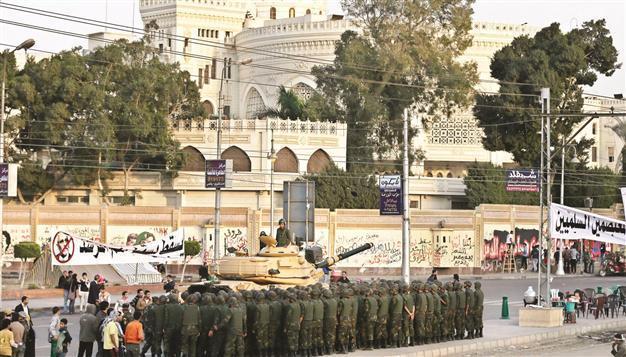Jets fly over Cairo as Morsi paddles back
İrem Köker CAIRO / Hürriyet

Egyptian army soldiers stand guard in front of the presidential palace in Cairo, Egypt yesterday. Egypt’s liberal opposition called for more protests, seeking to keep up the momentum of its street campaign against the presidential decree. AP photo
Armed gangs known as “axmen” have taken the stage again in Egypt after the latest turbulent period following the president’s controversial decree, which he scrapped after violent protests.Stationed in iconic Tahrir Square, axmen spread fear and terrorize the already-fragile situation in Egypt. They were established during last year’s uprising, which toppled strongman Hosni Mubarak, and were known to be supported by the Mubarak regime to spread fear among protesters.
According to some, they played a prominent role in the shift of protests from Tahrir to the Presidential Palace and target not only protesters but also journalists. Most recently, Anatolia news agency journalists were the target of these groups. Officials have said the setup of these gangs has changed since the end of the Mubarak regime. They are working not only for Mubarak regime supporters who have “gone underground” but also for ones who pay them to “cause disturbances.”
Meanwhile, Egypt’s president annulled a decree that gave him extra powers, but opponents said that he had deepened the conflict by pressing ahead with a vote on the Constitution.
‘Act of war’
President Mohamed Morsi and his supporters insist that the referendum should go ahead on Dec. 15 to seal a democratic transition. However Ahmed Said, a liberal leader of the main opposition National Salvation Front, said the withdrawal of Morsi’s decree had not in fact annulled its consequences, describing the race to a referendum as “shocking” and an “act of war” against Egyptians.
“I can’t imagine that after all this they want to pass a Constitution that doesn’t represent all Egyptians,” Said, the head of the Free Egyptians Party, told Reuters. The Front was scheduled to meet later yesterday to respond formally to the president’s decision.
Amid the ongoing tension, Egyptian F-16 fighter jets made low passes over the center of Cairo in a rare maneuver by the air force over the capital, according to Agence France-Presse. At the end of October, jets made similar passes as part of a surprise military exercise. The April 6 movement, prominent in the anti-Mubarak revolt, derided the result of talks on Dec. 8 as “manipulation and a continuation of deception in the name of law and legitimacy.”
Morsi issued a new decree in which the first article “cancels the constitutional declaration” of Nov. 22, the spokesman for the dialogue. He said the referendum on the Constitution would go ahead Dec. 15, citing legal obstacles to a delay. The new decree removed some parts of the old one that angered the opposition, including an article that had given Morsi broad powers to confront threats to the revolution or the nation.
It also dropped an article that had shielded Morsi’s actions from the courts until a new Parliament was elected.
Erdoğan calls Morsi
Turkish Prime Minister Recep Tayyip Erdoğan initiated a telephone conversation with Egyptian President Mohamed Morsi late Dec. 8, advising the Egyptian leader to initiate dialogue with the opposition.
In addition, Erdoğan said Turkey had been closely following developments in Egypt, Anatolia news agency reported. Erdoğan also said he was confident that Egypt was capable of overcoming its current problems thanks to its deeply rooted experience.
In response, Morsi said they would never allow the interruption of democracy in Egypt and told Erdoğan his view of recent developments.
















